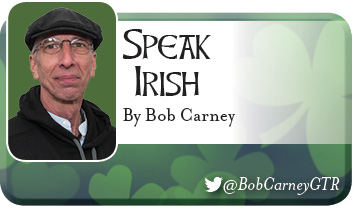

Speak Irish: Dinneen’s Dictionary and More
by Bob Carney
Languages evolve, technology and discovery add words to our vocabulary, and can cause others to fall from use. Regional slang can travel and end up becoming part of conversations far from where it originated.
I’m reminded of the story I heard of the origin of Bugs Bunny’s famous catch-phrase, “What’s up Doc?” Tex Avery, the director of the first Bugs Bunny cartoon, said calling someone “doc” was common among the younger generation in the 1920s in the part of Texas where he was from. Giving it to Bugs, he made it a phrase many Americans know, even if all we’re doing is imitating Bugs or annoying our dentist. For future generations it will probably become very obscure.
The book, “Home Ground, A Guide to the American Landscape,” ed. by Barry Lopez and Debra Gwartney, is a collection of words that describe our landscape and environment that are slowly being lost from lack of use. One of my favorite entries is, “thank you ma’am.”
A “thank you ma’am” is a bump or depression in a dirt or gravel road. It’s believed to come from the horse and buggy days when a young man and woman courting might take an afternoon ride in the countryside. Hit a bump while seated on a buggy and you might be thrown closer together and the young man might steal a kiss, “thank you ma’am!” Franklin Roosevelt spoke of “thank you ma’am’s” as bumps in the road to recovery from the Great Depression.
Irish Language Dictionary’s
All languages gain and lose words and phrases, thanks to O’Brien’s Dictionary from 1768, O’Reilly’s from 1864, and Rev. Patrick S. Dinneen and his Irish English Dictionary, published in 1904. We have access to some of those words in Irish.
 Here is just a small sample:
Here is just a small sample:
Adharca bruic – badger horns, something non-existent
Aidhcleadh – eye-biting
Aithe abhana – a kind of moss grown on stones in a river with a medicinal value
Babáil – a method of catching eels by draining water
Bibseach – to kill or put someone to death twice
Bochtán – a liquid measure, the full of twelve eggshells
Borr-uisce – fancy water, the frothy water that spreads over the sand when a wave breaks
Bróis – a bottle of whiskey given to the first horseman home to a wedding feast
Buaircín – a piece of wood put on the horns of a vicious cow
Cendail – the heads of decapitated enemies
Cinncheangalaigh – having the head bound as a madman
Ciorrbhadh – destruction by witchcraft or the evil eye
Cómhla bhreac – a magic door of fairy dwellings among the rocks
Cro – witchcraft
Cró – death, a flock, an iron bar, hut cottage or fortress
Croma – a measurement, the length of a middle finger
Dalbhdha – sorcery
Digla – evil
Dighle – very pure
Dricc – angry or a dragon
Dromach – a band or strap with hooks at each end, a part of the horse’s harness used in plowing
Éadtrú – one who is not doomed
Feothan – a stiff breeze
Fulacht – a pit used for cooking, filled with water brought to a boil by heating stones
Geanncanach – one of the lower and more vicious kinds of fairies
Ifne – worms said to come out of the marrow of corpses
Liagás – a fee paid to the church when blessed clay is put in the coffin
Maiste – twisted straw used for lighting a pipe
Páideog – a light made from a string of tow dipped in tallow
Púcóg – a covering for the eyes of cows
Ribeog – a tuft of wool left on sheep, sometimes dyed for identification
Saighead – an arrow head used as an amulet
Sas – sas,sas,sas a call to a dog (pís,pís,pís to call a cat
Scór – a stick a laborer would mark to count days he worked in order to be paid
Tarbhan’a – a parish bull, a bull that is common to the community
Torathar – a monster
Upadh – a sorcerer
Upaire – a sorcerer
Uptha – sorcery
Irish language dictionaries are a great place to spend on hour or so on the last of our pre-spring evenings. The Irish language is rich in it’s descriptive vocabulary, but is just as interesting when the simplest of words can have multiple meanings. Many dictionaries are in the public domain and can be read on-line.
Slán go Fóill!
*Bob Carney is a student of Irish history and language and teaches the Speak Irish Cleveland class every Tuesday at PJ McIntyre’s. He is also active in the Irish Wolfhound and Irish dogs orginizations in and around Cleveland. Wife Mary, hounds Morrighán and Rían and terrier Doolin keep the house jumping. He can be reached at [email protected]


Monthly newsmagazine serving people of Irish descent from Cleveland to Clearwater. We cover the movers, shakers & music makers each and every month.
Since our 2006 inception, iIrish has donated more than $376,000 to local and national charities.
GET UPDATES ON THE SERIOUS & THE SHENANIGANS!